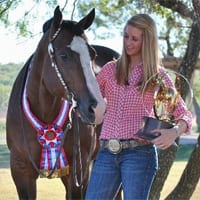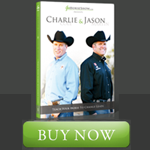Top competitors share their stories of transitioning from been-there, done-that horses to less experienced mounts.
Polished performances, steady patterns and calm confidence—it can take years to develop a winning partnership with a show horse. So what happens when it’s time to hit the reset button and try again with a new, less experienced horse? Top AQHA and APHA exhibitors share the ups-and-downs of the transition.
Q: What impacted your decision to make the change from a seasoned horse to a greener one and what did you find the most challenging about this transition?
Carey Nowacek of San Antonio, Texas--I have always enjoyed a challenge. When I bought Certify This Chex (Lugnut) (pictured right) he had only done the pleasure. Even though Brad (Jewett) did a majority of the all-around training, it was such a great experience going through the good and bad. The feeling you get when you’ve taken a horse from the beginning and having him be successful in the show arena is amazing. There was no question in my mind when looking to buy a new horse to replace Lugnut that I wanted a green one. My new horse, Born N Style, is really turning out to be a great all around horse. I bought her in late September as a green, project horse. Our first horse show was the Arizona Fall Championship. We showed in the three year-old non pro pleasure and won. I had never showed a three year old and it was a blast. Since then, we have been slowly adding the all around events, starting with the trail then the horsemanship and showmanship. I was so thankful when I finally got the go ahead from the “boss man” to show in the trail, horsemanship and showmanship after the Sun Circuit. Our first and only horse show since then we got points in every event. She is really turning into a great all around horse, and I am so excited to see what her future holds. The most challenging part is in the show pen. You may have everything ready to go in the warm up, but because you are on a green horse you may have the total opposite result when you’re the only one in the arena.
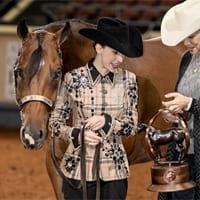 Nicole Barnes of Glenview, Illinois–As a non pro, I have learned to trust the instincts of my trainer(s) and their capabilities in matching a horse and rider together (especially for the pattern classes). Although I have taken this approach most recently – I realize that it’s been something instilled in my riding since I was just a kid. In 2002, my family purchased Zippos Ace of Spades – a horse that had a strong background in western pleasure but had little to no training in the all around events. He picked up the all around classes quickly and without much training. Fortunately, he was athletic and had a foundation that was easily transferred over to the pattern classes. Looking back, I realize that Ace was really the one that allowed me to find my love of turning a green horse into a seasoned one. Due to Ace’s untimely death in 2010, I was forced with the decision to purchase a green horse or try to find something seasoned. For me, the choice was obvious. I knew I had a team of talented trainers and supportive family and friends behind me and having always been taught to ride with the mentality of trying to teach your horse–I knew what path I wanted to take. The challenges in this transition are endless. Endless, but totally worth it. From finding the right horse to teaching a him to lope down the middle of the arena to experimenting with the lead change and the daunting task of teaching showmanship – I find joy in all of these challenges. No two days are the same with a green horse so it most certainly keeps me on my toes.
Nicole Barnes of Glenview, Illinois–As a non pro, I have learned to trust the instincts of my trainer(s) and their capabilities in matching a horse and rider together (especially for the pattern classes). Although I have taken this approach most recently – I realize that it’s been something instilled in my riding since I was just a kid. In 2002, my family purchased Zippos Ace of Spades – a horse that had a strong background in western pleasure but had little to no training in the all around events. He picked up the all around classes quickly and without much training. Fortunately, he was athletic and had a foundation that was easily transferred over to the pattern classes. Looking back, I realize that Ace was really the one that allowed me to find my love of turning a green horse into a seasoned one. Due to Ace’s untimely death in 2010, I was forced with the decision to purchase a green horse or try to find something seasoned. For me, the choice was obvious. I knew I had a team of talented trainers and supportive family and friends behind me and having always been taught to ride with the mentality of trying to teach your horse–I knew what path I wanted to take. The challenges in this transition are endless. Endless, but totally worth it. From finding the right horse to teaching a him to lope down the middle of the arena to experimenting with the lead change and the daunting task of teaching showmanship – I find joy in all of these challenges. No two days are the same with a green horse so it most certainly keeps me on my toes.
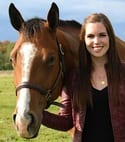 Mallory McKewen of Waterloo, Ontario–As a university student, the expenses really pile up. My good seasoned horse was in his prime and worth good money, and I’d found a reasonably priced two year-old that I liked. I was able to sell my seasoned horse and buy the two year-old in such a way that I made a profit to pay for school and could keep showing. What I found to be most challenging about making the switch were the ups and downs. While my young horse had more try than I ever could have expected, of course the consistency wasn’t there the way it was with my veteran. I recall even physical inconsistency, when he grew an inch in the hip partway through the show season. He went from being at the top of his classes in the performance halter and hunter under saddle, to just not having the same look and self carriage since he grew to be a little unbalanced, and started getting the gate within about two weeks. Once he evened out, he was back to his old self and doing well in those events by the end of the year again. He did absolutely nothing wrong, that little growth spurt just kind of affected everything for a short period of time. Going from that consistent same-every-weekend veteran horse to a three year-old definitely means that you have to accept that things will change as you progress!
Mallory McKewen of Waterloo, Ontario–As a university student, the expenses really pile up. My good seasoned horse was in his prime and worth good money, and I’d found a reasonably priced two year-old that I liked. I was able to sell my seasoned horse and buy the two year-old in such a way that I made a profit to pay for school and could keep showing. What I found to be most challenging about making the switch were the ups and downs. While my young horse had more try than I ever could have expected, of course the consistency wasn’t there the way it was with my veteran. I recall even physical inconsistency, when he grew an inch in the hip partway through the show season. He went from being at the top of his classes in the performance halter and hunter under saddle, to just not having the same look and self carriage since he grew to be a little unbalanced, and started getting the gate within about two weeks. Once he evened out, he was back to his old self and doing well in those events by the end of the year again. He did absolutely nothing wrong, that little growth spurt just kind of affected everything for a short period of time. Going from that consistent same-every-weekend veteran horse to a three year-old definitely means that you have to accept that things will change as you progress!
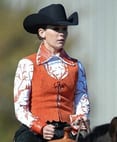 Nichole Chirico of Lakewood, Colorado–What impacted my decision to transition from a more seasoned horse to a younger horse were really financial reasons. I was very fortunate as a youth to have older, more experienced horses, but as an amateur I financially couldn’t afford to have a seasoned horse, so my only option was to purchase a horse that had zero show experience and start from the ground up. The most challenging part of making this change was understanding that for awhile I wasn’t going to be as competitive as I had been with seasoned horses. I started showing my last horse as a three year-old on a very limited show budget, so for the first year or two I was just trying to get experience in the show pen and gradually getting him comfortable in the arena doing more difficult maneuvers, like flying lead changes, hand gallops and tight corners.
Nichole Chirico of Lakewood, Colorado–What impacted my decision to transition from a more seasoned horse to a younger horse were really financial reasons. I was very fortunate as a youth to have older, more experienced horses, but as an amateur I financially couldn’t afford to have a seasoned horse, so my only option was to purchase a horse that had zero show experience and start from the ground up. The most challenging part of making this change was understanding that for awhile I wasn’t going to be as competitive as I had been with seasoned horses. I started showing my last horse as a three year-old on a very limited show budget, so for the first year or two I was just trying to get experience in the show pen and gradually getting him comfortable in the arena doing more difficult maneuvers, like flying lead changes, hand gallops and tight corners.
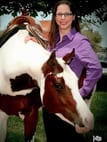 Angie Morrow of Maple Creek, Saskatchewan–I wanted to see what I was capable of doing with a younger horse and developing it into that seasoned horse with help from my trainer. The most challenging part at first was remembering that it was young and green and that it didn’t have the knowledge that a seasoned horse has. It was frustrating at first when I hit road blocks that I wasn’t sure how to fix, but with help I was able to get past them and the horse progressed with flying colors.
Angie Morrow of Maple Creek, Saskatchewan–I wanted to see what I was capable of doing with a younger horse and developing it into that seasoned horse with help from my trainer. The most challenging part at first was remembering that it was young and green and that it didn’t have the knowledge that a seasoned horse has. It was frustrating at first when I hit road blocks that I wasn’t sure how to fix, but with help I was able to get past them and the horse progressed with flying colors.
 Jennifer Kyle of Portland, Oregon–I transitioned from GT Dressed in Blue, a seasoned show horse, to This Is Why Im Here. “Billy Bob” was a great show horse, but my mom had started showing and I wanted a horse I could grow with and own for a long time. Billy Bob was a good fit for her in the Select competition and for her personality. I also wanted a horse with enough potential to take me to the World Show pen successfully. The most challenging part of making this change was going from having a horse who knew all the events to one who was just started learning them. I am very passionate about showing, so I couldn’t wait to teach Jack everything. Overall – I am a very impatient person. However, my trainer, Melissa Zanetti, did a great job of helping me understand that – just like a person – you have to let a horse learn at his pace.
Jennifer Kyle of Portland, Oregon–I transitioned from GT Dressed in Blue, a seasoned show horse, to This Is Why Im Here. “Billy Bob” was a great show horse, but my mom had started showing and I wanted a horse I could grow with and own for a long time. Billy Bob was a good fit for her in the Select competition and for her personality. I also wanted a horse with enough potential to take me to the World Show pen successfully. The most challenging part of making this change was going from having a horse who knew all the events to one who was just started learning them. I am very passionate about showing, so I couldn’t wait to teach Jack everything. Overall – I am a very impatient person. However, my trainer, Melissa Zanetti, did a great job of helping me understand that – just like a person – you have to let a horse learn at his pace.
 Lexy Parisek of Murray, Kentucky–My transition from having a seasoned show horse to a younger green horse has had a big impact on my life. This was not something that was easy to decide, considering I lost my horse Slow N Natural (Roger) a month after the 2013 AQHYA World Show to Potomac Horse Fever. The most challenging part of making this decision was opening up my heart enough to consider that there was another horse out there that would be able to compare to Roger. It is so difficult after you have a partnership with a horse that is so in sync (body, mind, heart and soul), after years of bonding and learning to become a team and trust each other, then having to start over completely.
Lexy Parisek of Murray, Kentucky–My transition from having a seasoned show horse to a younger green horse has had a big impact on my life. This was not something that was easy to decide, considering I lost my horse Slow N Natural (Roger) a month after the 2013 AQHYA World Show to Potomac Horse Fever. The most challenging part of making this decision was opening up my heart enough to consider that there was another horse out there that would be able to compare to Roger. It is so difficult after you have a partnership with a horse that is so in sync (body, mind, heart and soul), after years of bonding and learning to become a team and trust each other, then having to start over completely.
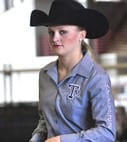 Logan Pluhar of Canyon, Texas–Honestly, it came down to funds. My parents couldn’t afford a top-tier show horse, and my current horse, bless his heart, didn’t have the high talent ceiling needed to succeed at the next level. So I took on a very green project. I started with a little colt barely over a year old when I was 13 and stuck with him until the end of my youth career. The most challenging part for me was being patient in the long periods of transition as my horse and I struggled through learning curves together. You really have to learn to value the rare successes you have early on. My first few shows, I set goals and expectations that were reasonably high, and I met a few and missed a lot.
Logan Pluhar of Canyon, Texas–Honestly, it came down to funds. My parents couldn’t afford a top-tier show horse, and my current horse, bless his heart, didn’t have the high talent ceiling needed to succeed at the next level. So I took on a very green project. I started with a little colt barely over a year old when I was 13 and stuck with him until the end of my youth career. The most challenging part for me was being patient in the long periods of transition as my horse and I struggled through learning curves together. You really have to learn to value the rare successes you have early on. My first few shows, I set goals and expectations that were reasonably high, and I met a few and missed a lot.
Q: What advice would you share with someone thinking of moving on to a younger horse?
Carey: My advice to anyone considering a younger/green horse would be to take your time and be patient. Do not try and push a horse to too many events too quickly. Slowly adding different events will get your horses confidence up. Usually when trying to throw too many things at a green horse at once they will get confused, upset and not enjoy their job.
Nicole–I would suggest taking the time to evaluate your goals before moving on to a green horse. Here is a short list of questions I find myself asking prior to a purchase. What amount of time will I have (or my trainer) to commit to a green horse in the near future? What classes am I looking to improve on? What type of horse do I think I need to look for to get me there? What age horse am I looking for? A young futurity horse that may take more time or a green pattern senior horse that might pick up the events faster? What amount of money am I looking to spend on a purchase and then the long term commitment into a horse (training, farrier, vet, hauling, etc)? I bought my current horse, The Perfect Kryme, in 2011. Since my grandparents who got me hooked on horses were no longer in the picture, Clyde was the first big purchase I had to make on my own. As I was contemplating the purchase, I thought to myself–I could be putting this money to a house rather than a horse. But after thoughtful evaluation with my trainer, Brad Kearns, and family, we all agreed this was the best option for me at the time. Ultimately, when considering moving on to a younger horse you have to know that the likelihood for bumps along the way and a decelerated program could be in your future. But those bumps along the way are what help to make a team between you and your horse – the ultimate reward.
Mallory: It takes time. Remind yourself that it’s going to take a while to get into the same groove and consistency you had with your old seasoned horse. While it can be tempting to push the young horse to enjoy the same success you had with the old one, the long term payoff is what you’re after.
Nichole: Be patient. It’s a long difficult road. There are going to be shows where you might not get your name called, or might not be able to do the maneuvers some of the more experienced horses can do, but I promise in the end it will be the most rewarding feeling in the world.
Angie: Don’t lose your temper, they are relying on you to give them the knowledge. You will hit a few “baby road blocks” but keep pushing through. Take your time. Don’t rush– they will appreciate it and they will last longer.
Jennifer: Be patient when looking for your new horse. Find a horse whose personality fits yours. When you find the horse, then practice patience with them while they are learning.
Lexy: To anyone put in my similar situation; it’s always a
hard call to make. What happened to Roger was a freak thing but it
happens in this sport that we are in. I feel that you need to have a
special bond with any horse you want to be competitive with. All the
hours we spend with them, it needs to be enjoyed by both the horses and
us and I feel it’s very important to put forth everything for something
you love to do.
Logan: You can’t replicate this feeling by always riding a
finished horse. This type of self-confidence isn’t bought, it’s earned.
After all was said and done, I gained invaluable experience. I still
have zero regrets, so yes, changing from a finished to a
greener-than-the-finest-alfalfa-in-Amarillo horse was an absolute
success. My advice to anyone thinking about making this switch: Be
prepared to work your butt off, but know that there is a payoff greater
than trophies and ribbons waiting for you at the end. You become a better rider because young horses
require you to cue them properly and be very consistent. Young horses
need a lot of patience, they are going to make many mistakes and that is
okay. The rider can’t be upset or discouraged if the class doesn’t go as
well because the horse made a mistake.
Q: When it’s all said and done, do you consider this change a success?
Carey–I would totally consider it a success. Not just the placings or the points, but the success I feel that my horse trusts me and continues to grow with every ride!
Nicole–Success is measured in many different ways. For me, working with a horse to teach him new events is most certainly a success. I am forever grateful for the great success I have had inside the show pen, but it undoubtedly doesn’t come without many small victories along the way. I think it is those small victories that keep me going – AND coming back for more horse after horse. At this time last year, Clyde wasn’t changing leads. But through much persistence and dedication to the task, he now is qualified for this year’s AQHA World Show in Western Riding – a goal I had only dreamed about coming true. Transforming a green horse into a seasoned show competitor isn’t for everyone. I find it very rewarding and feel extremely fortunate to have the opportunity. Just last weekend I saw one of my past green horses that I bought as a three year old. He’s now excelling in the youth all around events in my area. And that is the greatest success I could ask for.
Mallory— While I knew he’d eventually be able to do it all, I really only expected to show him in the showmanship, hunter under saddle, and possibly equitation in the first season. However, he has so much try that he ended up getting broke extremely fast. He had points in seven events by the end of his first year. I didn’t expect to even take him to the Congress as a three-year-old all-arounder, but we ended up going and making the finals in the Amateur Showmanship and having a top 20 score in the Amateur Trail. I was blessed with an extremely willing young horse with a huge heart. I’m a DIY amateur and he got broke extremely fast for me, I was lucky.
Nichole–I would definitely consider this change successful. It was an extremely long and hard road but in the end it was very rewarding. I think the most exciting part about working with a young and inexperienced horse is being a part of the learning process. Being able to say you placed top 10 at the World Show on a horse you taught the showmanship to all by yourself is an amazing feeling.
Angie— I consider this change very successful. My first young horse was a two year old, then I moved onto many different yearlings through the years and then my first baby that I raised and trained myself. I love the babies/young horses and being able to sculp and mold them into the horses they are. I find it extremely rewarding.
Jennifer–I loved GT Dressed in Blue, but Jack is the best fit I have ever had in a horse. He tries so hard and gives his all each time you ride. I couldn’t ask for a better teammate – especially for my showing style and my personality.
Lexy— I think this change has had a good start; it would be very surprising if he can out shine what Roger did with his show career. But as long as my very talented trainer, Linda Crothers, is riding him I feel that he can do anything. This is my first amateur year so I’m incredibly hopeful that it will lead to a good start.
Logan— There were multiple times when I wanted to quit, a lot of very difficult days to ride through, and my fair share of body imprints in the arena dirt from being unceremoniously ejected. The most important thing is to have a source of motivation as your immovable pillar. I had very high long-term goals in mind, but I had to accept that there were thousands of little steps to take and a lot of time to be invested to reach those. At the end of my youth career, I had compiled six fun years with my little gelding. We didn’t reach some of the sparkly, high-profile goals I dreamed about as a kid, but I wouldn’t trade the rollercoaster ride for anything. Our successes – a third in a deep 15-18 horsemanship class at a major show, a semifinalist in the showmanship at World – they may not seem like that much to a lot of 15-18 kids out there, but they meant the world to me because I could proudly stand up and say I put in every last second of work to get there.


